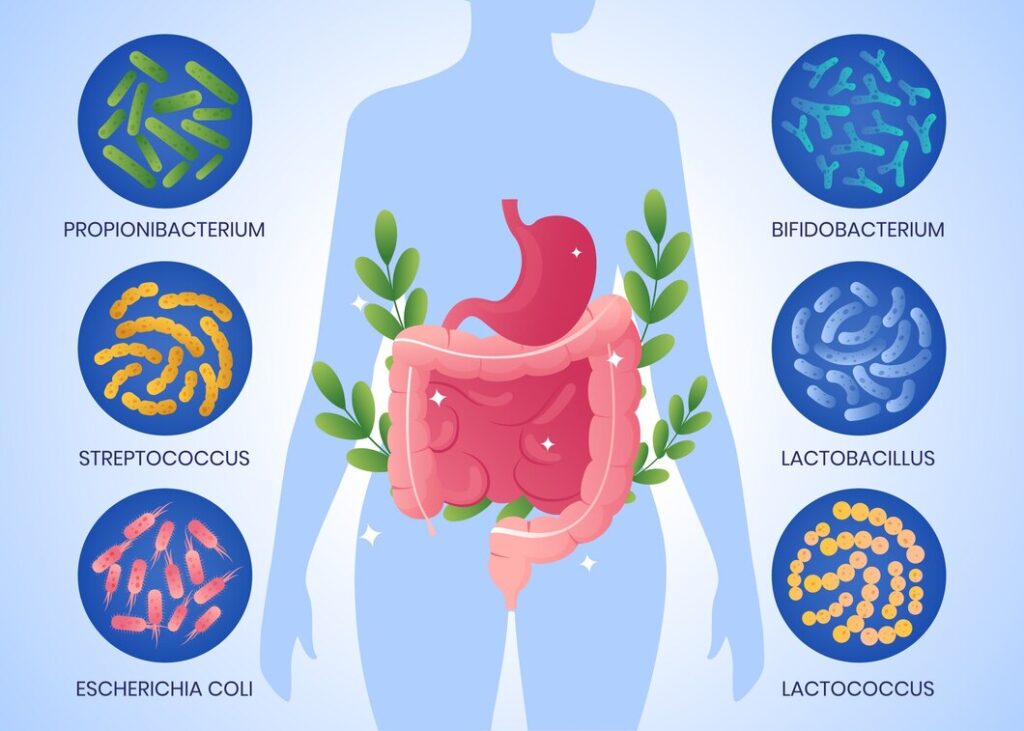Probiotics;
Key Points:
- Definition: Live microorganisms for health benefits.
- Types: Bacteria, yeasts.
- Sources: Yogurt, supplements.
- Benefits: Gut health, immunity.
- Conditions: Diarrhea, IBS, allergies.
- Mechanisms: Competition, immune support.
- Prebiotics: Fibers aiding probiotic growth.

What are Probiotics?
Probiotics are live microorganisms that confer health benefits when consumed in adequate amounts. They are often referred to as “good” or “friendly” bacteria because of their positive impact on digestive health and overall well-being.
Health Benefits of Probiotics
Probiotics offer a range of health benefits, including:
- Improved Digestive Health: Probiotics help maintain a healthy balance of gut bacteria, promoting efficient digestion and reducing symptoms of digestive disorders like bloating, gas, and diarrhea.
- Enhanced Immune Function: The beneficial bacteria in probiotics stimulate the immune system, helping to ward off infections and illnesses.
- Support for Mental Health: Emerging research suggests a link between gut health and mental well-being, with probiotics potentially playing a role in reducing symptoms of depression and anxiety.
Which Foods Have Probiotics?
Probiotics are live microorganisms that offer numerous health benefits, particularly for digestive health and overall well-being. Incorporating probiotic-rich foods into your diet is an excellent way to support gut health and promote a balanced microbial environment in the digestive system.
1. Yogurt
- Description: Yogurt is one of the most well-known sources of probiotics, containing live cultures of beneficial bacteria such as Lactobacillus and Bifidobacterium.
- Types: Look for plain, unsweetened yogurt with labels indicating the presence of live and active cultures.
- Varieties: Greek yogurt, kefir yogurt, and Icelandic skyr are popular options with high probiotic content.
2. Kefir
- Description: Kefir is a fermented dairy product similar to yogurt but with a thinner consistency and tangier flavor.
- Cultures: Kefir typically contains a diverse range of probiotic strains, including lactobacilli, bifidobacteria, and yeasts.
- Varieties: Traditional dairy kefir, as well as non-dairy options like coconut kefir and water kefir, are available for those with lactose intolerance or dairy-free diets.
3. Sauerkraut
- Description: Sauerkraut is a fermented cabbage dish that originated in Eastern Europe and is rich in probiotics.
- Cultures: The fermentation process of sauerkraut produces lactic acid bacteria, including Lactobacillus plantarum and Lactobacillus brevis.
- Varieties: Look for unpasteurized sauerkraut, as pasteurization can kill beneficial bacteria. It may be found in refrigerated sections or specialty stores.
4. Kimchi
- Description: Kimchi is a traditional Korean dish made from fermented vegetables, most commonly napa cabbage and Korean radishes.
- Cultures: Kimchi contains a variety of probiotic strains, including Lactobacillus brevis, Lactobacillus plantarum, and Weissella species.
- Varieties: There are many regional variations of kimchi, with flavors ranging from spicy to mild and ingredients like garlic, ginger, and chili peppers.
5. Miso
- Description: Miso is a traditional Japanese seasoning made from fermented soybeans, rice, barley, or other grains.
- Cultures: Miso fermentation produces probiotic bacteria such as Lactobacillus, Pedicoccus, and yeast species like Saccharomyces.
- Varieties: Miso comes in various colors and flavors, including white, yellow, and red, each offering unique taste profiles and culinary uses.
6. Tempeh
- Description: Tempeh is a fermented soybean product originating from Indonesia, known for its nutty flavor and firm texture.
- Cultures: The fermentation process of tempeh involves Rhizopus oligosporus, a type of mold that binds the soybeans together and imparts probiotic properties.
- Varieties: Look for organic, non-GMO tempeh in health food stores or Asian markets, and experiment with different marinades and cooking methods.
7. Kombucha
- Description: Kombucha is a fermented tea beverage made by fermenting sweetened tea with a symbiotic culture of bacteria and yeast (SCOBY).
- Cultures: Kombucha fermentation produces acetic acid bacteria and various yeast strains, including Saccharomyces cerevisiae and Brettanomyces bruxellensis.
- Varieties: Kombucha is available in a wide range of flavors, from classic to fruity and herbal blends, and can be found in health food stores and specialty markets.
• Read Another Article: Top Superfoods for hair growth
How Probiotics Work?
Probiotics work by colonizing the gut with beneficial bacteria, crowding out harmful pathogens and promoting a balanced microbial environment. They also produce compounds like short-chain fatty acids that nourish the cells lining the gut and support overall gut health.
What are the Top 10 Probiotic Foods?
- Yogurt
- Kefir
- Sauerkraut
- Kimchi
- Miso
- Tempeh
- Kombucha
- Pickles (fermented)
- Traditional buttermilk
- Natto
Who Needs Probiotics the Most?
Individuals who may benefit most from probiotics include those with digestive disorders such as irritable bowel syndrome (IBS), inflammatory bowel disease (IBD), lactose intolerance, and antibiotic-associated diarrhea. Additionally, people with weakened immune systems or those prone to frequent infections may also benefit from probiotic supplementation.
Are Probiotics Good Every Day?
While probiotics are generally safe for daily consumption, their effectiveness may vary depending on individual health conditions and goals. For most people, incorporating probiotic-rich foods into their diet on a regular basis can support overall gut health and well-being.
How Can I Improve My Gut Health?
In addition to consuming probiotic-rich foods, improving gut health involves maintaining a balanced diet high in fiber, staying hydrated, managing stress levels, getting regular exercise, and avoiding excessive alcohol and processed foods.
What are Probiotic Tablets?
Probiotic tablets are supplements containing concentrated doses of beneficial bacteria, typically in the form of capsules or tablets. They are designed to deliver specific strains of probiotics in controlled amounts, providing an alternative option for those seeking to boost their probiotic intake.
Do Normal People Need Probiotics?
While probiotics can benefit individuals with specific health conditions or dietary preferences, they are generally considered safe and beneficial for most people. Incorporating probiotic-rich foods into a balanced diet can support overall gut health and contribute to overall well-being.
Summary:
Probiotics play a vital role in promoting digestive health, enhancing immune function, and supporting overall well-being. Whether consumed through probiotic-rich foods or supplements, incorporating these beneficial bacteria into your daily routine can contribute to a healthier gut and a happier you. With a better understanding and their benefits, you can take proactive steps to nourish your gut and optimize your health.


Pingback: Common health conditions - MedWebMD